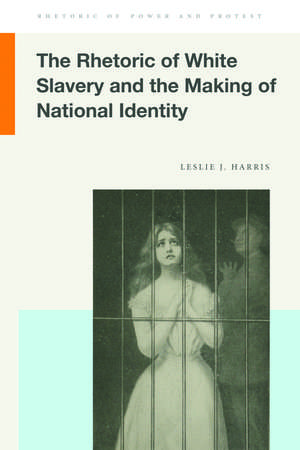The Rhetoric of White Slavery and the Making of National Identity: Rhetoric of Power and Protest
Autor Leslie J Harrisen Limba Engleză Paperback – iul 2023
Preț: 275.77 lei
Nou
Puncte Express: 414
Preț estimativ în valută:
52.77€ • 56.43$ • 43.100£
52.77€ • 56.43$ • 43.100£
Carte indisponibilă temporar
Doresc să fiu notificat când acest titlu va fi disponibil:
Se trimite...
Preluare comenzi: 021 569.72.76
Specificații
ISBN-13: 9781611864595
ISBN-10: 1611864593
Pagini: 266
Dimensiuni: 152 x 229 x 18 mm
Greutate: 0.37 kg
Editura: Michigan State University Press
Colecția Michigan State University Press
Seria Rhetoric of Power and Protest
ISBN-10: 1611864593
Pagini: 266
Dimensiuni: 152 x 229 x 18 mm
Greutate: 0.37 kg
Editura: Michigan State University Press
Colecția Michigan State University Press
Seria Rhetoric of Power and Protest
Recenzii
Exhaustively researched, concisely written, and cogently argued, Harris’s analysis of historical debates over “white slavery” provides insightful parallels to contemporary conspiracy theories about sex trafficking. Harris makes clear the rhetoric around “white slavery” was less about prostitution and more about whiteness and national identity, women’s public role, and the use of mobility (and its restrictions) as a form of social control.
—Catherine Helen Palczewski, professor of Communication and Media, University of Northern Iowa, coauthor of Rhetoric in Civic Life (3rd ed.) and Gender in Communication (4th ed.)
Harris’s thoroughly researched and carefully argued case studies present a cohesive and compelling argument about how rhetorics of race, gender, and mobility have been deployed to shore up a white supremacist version of US national identity. This important research lends insight not only into historical discourses about womanhood and sexual exploitation; the book also outlines troubling themes and strategies that often are present in contemporary anti-trafficking rhetoric. This book is a must-read for anyone interested in understanding how gendered exploitation is strategically and cynically used to perpetuate oppressive power structures.
—Karrin Vasby Anderson, professor of communication studies, Colorado State University, and coauthor of Woman President: Confronting Postfeminist Political Culture
—Catherine Helen Palczewski, professor of Communication and Media, University of Northern Iowa, coauthor of Rhetoric in Civic Life (3rd ed.) and Gender in Communication (4th ed.)
Harris’s thoroughly researched and carefully argued case studies present a cohesive and compelling argument about how rhetorics of race, gender, and mobility have been deployed to shore up a white supremacist version of US national identity. This important research lends insight not only into historical discourses about womanhood and sexual exploitation; the book also outlines troubling themes and strategies that often are present in contemporary anti-trafficking rhetoric. This book is a must-read for anyone interested in understanding how gendered exploitation is strategically and cynically used to perpetuate oppressive power structures.
—Karrin Vasby Anderson, professor of communication studies, Colorado State University, and coauthor of Woman President: Confronting Postfeminist Political Culture
Notă biografică
Leslie J. Harris is an associate professor at the University of Wisconsin–Milwaukee. Her research focuses on rhetoric and public culture, especially at the intersections of gender, race, and class. She has received numerous awards, including a major grant from the Wisconsin Humanities Council, for her public humanities work on Voices of Gun Violence, a living archive of stories about gun violence in the Milwaukee area. Harris is a past president for the Organization for Research on Women and Communication and has served as an officer for the Rhetoric Society of America.
Descriere
At the turn of the twentieth century, the white slavery panic pervaded American politics, influencing the creation of the FBI, the enactment of immigration law, and the content of international treaties. At the core of this controversy was the maintenance of white national space. In this comprehensive account of the Progressive Era’s sex trafficking rhetoric, Leslie Harris demonstrates the centrality of white womanhood, as a symbolic construct, to the structure of national space and belonging.
